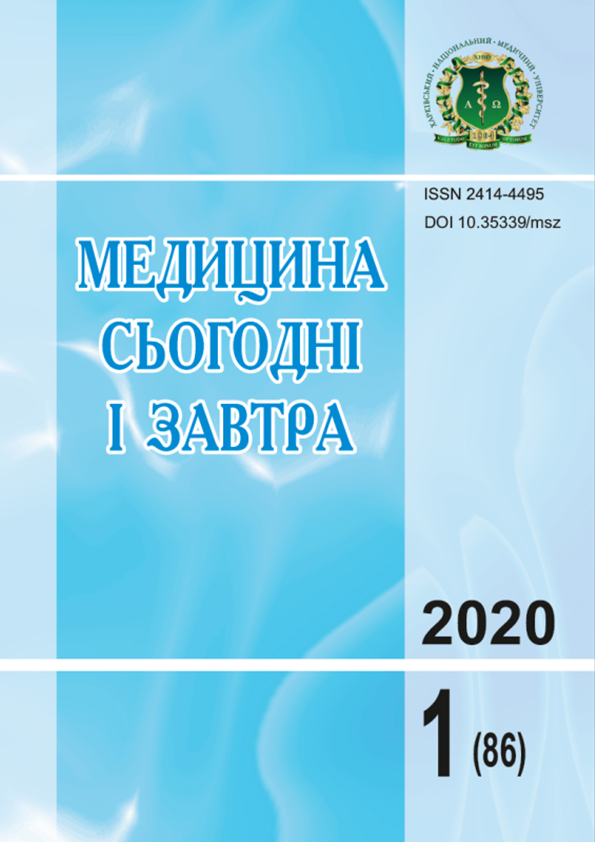Abstract
In order to assess the characteristics of the clinical manifestation of CHF with obesity, taking into account the polymorphism of the CYP2D6*4 gene of the cytochrome P450 system in terms of patient’s quality of life a prospective randomized controlled trial was conducted, 127 people (93 men and 34 women) aged 32-87 (61) years with CHF of II—III stages, 1^1 functional class according to the classification of the New York Heart Association (NYHA) have been examined. The main group consisted of 73 patients with obesity of 1 degree and higher, the comparison group consisted of 54 patients without obesity, the control group consisted of 21 people without cardiovascular disorders. Research methods included estimation of clinical symptom score scale, 6-minute walk test, quality of life (with the Minnesota questionnaire for patients with heart failure), assessment of subjective symptoms and course of the disease, anthropometric data, determination of objective signs of the disease; instrumental methods (Doppler echocardiography, basic laboratory examination, etc.), as well as genetic research (G1846A variants of the CYP2D6 gene real-time polymerase chain reaction), statistical non-parametric methods (with 0.05 p-value thresold). It is shown, that in the clinical aspect, patients of the main group have been characterized by a tendency to more expressive pathological manifestations of CHF, especially in carriers of the heterozygous GA variant of the CYP2D6*4 gene of the cytochrome P450 system. According to the Minnesota questionnaire, the clinical condition of patients and the quality of life in case of GG polymorphism variant was better than in GA carriers of the CYP2D6*4 genotype variant of the cytochrome P450 system.
Keywords: chronic heart failure, quality of life, obesity, genetic polymorphism, treatment, prognosis.
References
Bozkurt, B., Aguilar, D., Deswal, A., Dunbar, S. B., Francis, G. S., Horwich, T. et al. (2016). Contributory risk and management of comorbidities of hypertension, obesity, diabetes mellitus, hyperlipidemia, and metabolic syndrome in chronic heart failure: a scientific statement from the American Heart Association. Circulation, 134(23), e535-e578. DOI: 10.1161/CIR.0000000000000450. PMID: 27799274.
Havriushina, S. V., Aheiev, F. T. (2018). Serdechnaia nedostatochnost s sokhranennoi fraktsiiei vybrosa levoho zheludochka: epidemiolohiia, «portret» bolnoho, klinika, diahnostika [Heart failure with preserved left ventricular ejection fraction: epidemiology, patient portrait, clinical picture, diagnosis]. Kardiolohiia — Cardiology, 58(S4), 55-64. DOI: 10.18087/cardio.2467.
Wintrich, J., Kindermaim, I., Ukena, C., Selejan, S., Werner, Chr., Maack, Chr., et al. (2020). Therapeutic approaches in heart failure with preserved ejection fraction: past, present, and future. Clin. Res. Cardiol., 109(9), 1079-1098. DOI: 10.1007/s00392-020-01633-w. PMID: 32236720. PMCID: PMC7449942.
Chuquiure-Valenzuela, E., Fiscal-Lopez, O., Garcia-Romero, D., Chuquiure-Gil, M. J., Silva-Ruz, C., Aguilar-Moreno, S., et al. (2019). Clinimetric analysis of heart failure in mexican patients. Arch. Cardiol. Mex., 89(4), 339-347. DOI: 10.24875/ACM.M19000054. PMID: 31834324.
Reddy, Y. N. V, Riklii, A., Obokata, M., Shah, S.J., Eewis, G. D., Abou-Ezzedine, O. F., et al. (2020). Quality of life in heart failure with preserved ejection fraction: importance of obesity, functional capacity, and physical inactivity. Eur J. Heart Fail., 22(6), 1009-1018. DOI: 10.1002/ejhf.l788. PMID: 32150314.
Horwich, T. B., Fonarow, G. C., Clark, A. L. (2018). Obesity and the obesity paradox in heart failure. Prog. Cardiovasc. Dis., 61(2), 151-156. DOI: 10.1016/j.pcad.2018.05.005. PMID: 29852198.
Carbone, S., Eavie, C. J., Arena, R. (2017). Obesity and heart failure: focus on the obesity paradox. Mayo Clin. Proc., 92(2), 266-279. DOI: 10.1016/j.mayocp.2016.11.001. PMID: 28109619.
Zhai, A. B., Haddad, H. (2017). The impact of obesity on heart failure. Curr. Opin. Cardiol., 32(2), 196-202. DOI: 10.1097/HC0.0000000000000370. PMID: 28092289.
Hasanov, Yu. Ch. (2019). Klinichna ta instrumentalna otsinka efektyvnosti metoprolola suktsynatu u khvorykh iz khronichnoiu sertsevoiu nedostatnistiu na tli ozhyrinnia: henetychni aspekty indyvidualnoi chutlyvosti ta perenosymosti [Clinical and instrumental evaluation of the efficacy of metoprolol succinate in patients with chronic heart failure in obesity: genetic aspects of individual sensitivity and tolerability]. Candidate’s thesis. Kharkiv [in Ukrainian].
Chrysant, S. G., Chrysant, G. S. (2019). Obesity-related heart failure with preserved ejection fraction: new treatment strategies. Hosp. Pract., 47(2), 67-72. DOI: 10.1080/21548331.2019.1575662. PMID: 30712418.
De Andres, F., Teran, S., Hernandez, F., Teran, E., Llerena, A. (2016). To genotype or phenotype for personalized medicine? CYP450 drug metabolizing enzyme genotype-phenotype concordance and discordance in the Ecuadorian population. OMICS, 20(12), 699-710. DOI: 10.1089/ omi.2016.0148. PMID: 27849442.
Beigel, R., Cercek, B., Siegel, R. J., Hamilton, M. A. (2015). Echo-Doppler hemodynamics: an important management tool for today’s heart failure care. Circulation, 131(11), 1031-1034. DOI: 10.1161/CIRCULATIONAHA.114.011424. PMID: 25779543.
Del Tredici, A. L., Malhotra, A., Dedek, M., Espin, F., Roach, D., Zhu, G.-D., et al. (2018). Frequency of CYP2D6 alleles including structural variants in the United States. Front. Pharmacol., (9), 305. DOI: 10.3389/fphar.2018.00305, PMID: 29674966. PMCID: PMC5895772.
Elfaki, I., Mir, R., Almutairi, F. M., Duhier, F. M. A. (2018). Cytochrome P450: polymorphisms and roles in cancer, diabetes and atherosclerosis. Asian Рас. J. Cancer Prev., 19(8), 2057-2070. DOI: 10.22034/APJCP.2018.19.8.2057. PMID: 30139042. PMCID: PMC6171375.
Tornio, A., Backman, J. T. (2018). Cytochrome P450 in pharmacogenetics: an update. Adv. Pharmacol., (83), 3-32. DOI: 10.1016/bs.apha.2018.04.007. PMID: 29801580.
Smirnov, V. V, Abdrashitov, R. Kh., Yehorenkov, Ye. A., Hildeieva, H. N., Ramenskaia, H. V., Permiakov, R. A. (2015). Vliianiie izofennenta CYP2D6 na metabolizm lekarstvennykhpreparatov і melody opredeleniia yeho aktivnosti [Influence of CYP2D6 isoenzyme on drug metabolism and methods for determining its activity]. Vedomosti nauchnoho tsentra ekspertizy sredstv meditsinskoho primeneniia. Klinicheskaia farmakolohiia — Bulletin of the Scientific Center for the Expertise of Medicinal Products. Clinical Pharmacology, (3), 32-35.
Gao, X., Wang, H., Chen, H. (2017). Impact of CYP2D6 and ADRB1 polymorphisms on heart rate of post-PCI patients treated with metoprolol. Pharmacogenomics, (2). DOI: 10.2217/pgs-2017-0203. PMID: 29095089.

